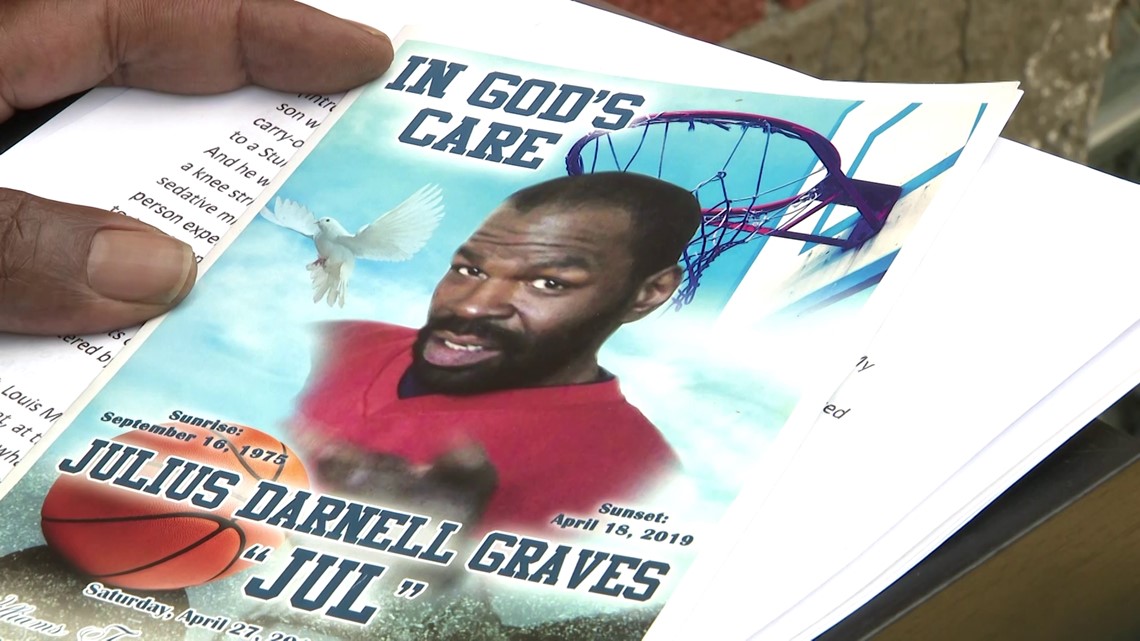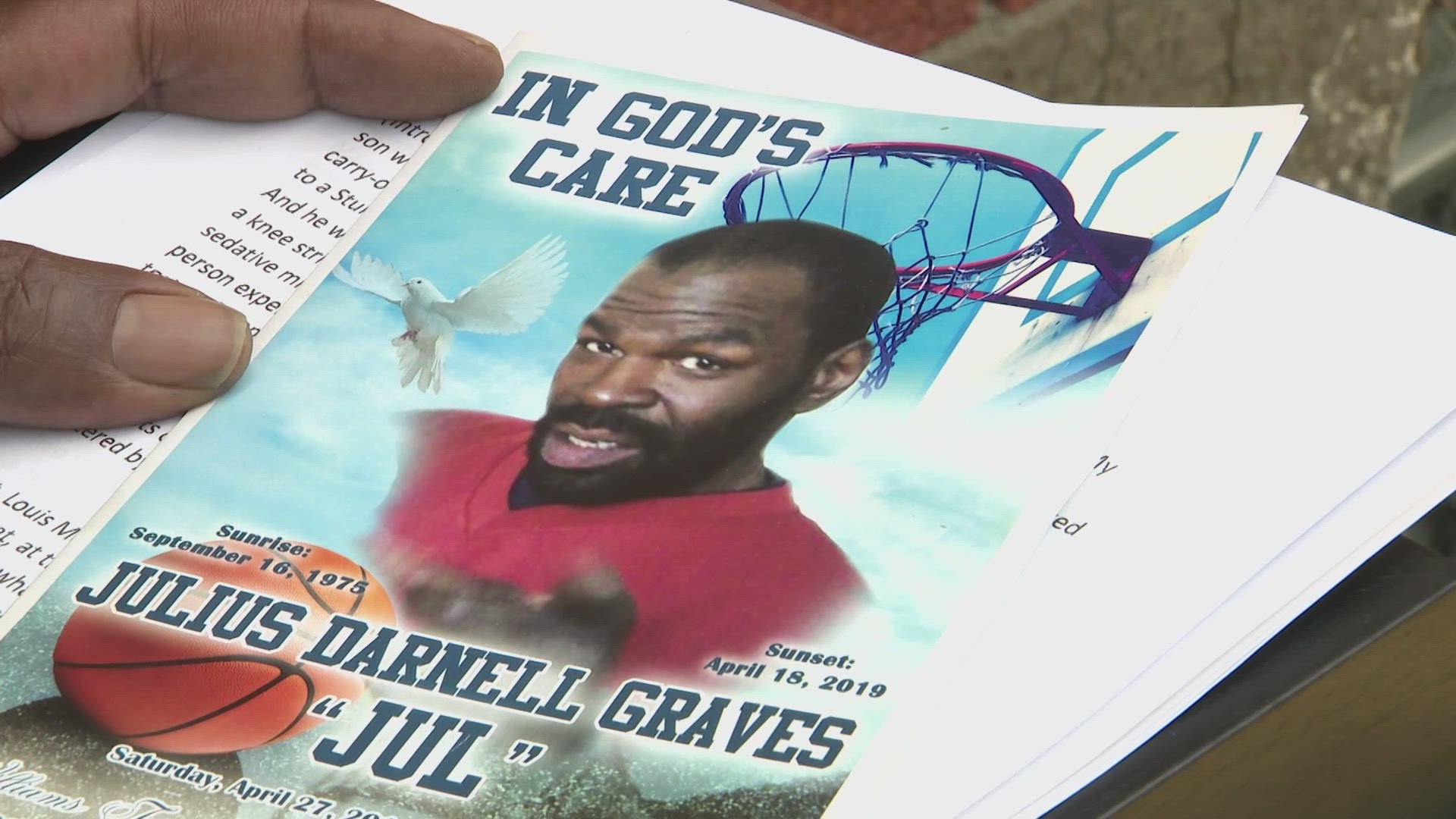ST. LOUIS — Outside the home that reminds him every day of loss and heartache, Larry Graves tells the I-Team that police have gotten away with murder.
“He was a good person," Graves said. "He was a better person than me."
Four years ago, Graves lost his only child.
“Oh, he suffered from schizophrenia for over 20 years," he said.
A witness said he was acting erratically and threatening violence. It led to an encounter with police.
Graves said his son, Julius Graves, was sitting at a bus stop near Forest Park. He said he was tasered, then injected with sedatives. Police kneed him in his mid-section and held him face-down on the ground. He went into cardiac arrest and died five days later. On the Medical Examiner’s report, his father saw a cause of death that did not make sense. Medical examiners ruled that excited delirium caused or contributed to the police-related 2019 death.


"I never heard of that term, so I Googled it," Graves said.
The term “excited delirium" is controversial. Many researchers and medical professionals argue it’s racist, too. It's a term used to describe severe agitation, “superhuman strength” and sometimes sudden death in encounters with police.
Researchers say the term has been used for decades to help clear law enforcement of wrongdoing after someone dies in their custody.
The American Medical Association has said “excited delirium” is not a diagnosis, and the American Medical Association, American Psychiatric Association, American Academy of Emergency Medicine, National Association of Medical Examiners, American College of Medical Toxicology and American College of Emergency Physicians have disavowed the term.
In early October, California became the first state to ban the term as a cause of death. But around the country, we discovered it’s still being used.
5 On Your Side's sister station KUSA in Denver has linked 139 deaths to the term since 2010, leaving dozens of people, just like Graves, in the dark about how and why their loved ones died.
Richard Burns is the exception. The I-Team talked with him at his home in Springfield, Illinois.
“It's been a long struggle," said Burns, who lost his brother 13 years ago.
"He was the best man at my wedding," he said. "I was the best man in his."
His brother, Patrick Burns, suffered from bipolar disorder. The family’s lawyer told the I-Team that on a winter day in 2010, he went into his neighbor’s home by mistake, thinking it was his. The neighbors called the police, who handcuffed him. Police reports show they tied his hands and feet together and then tased him about 20 times. Police held him in a prone-restraint position, or face-down. It made it hard to breathe.
Five months ago, the county coroner corrected his brother’s death certificate, replacing “excited delirium” with “positional asphyxia.” That means police suffocated him.


“Many people were being misled by this term," Burns said.
Kelly Gillespie is a Saint Louis University law professor. She believes all states need to ban law enforcement and medical examiners from using “excited delirium” to justify forceful restraint and death.
“It is an excuse to harm them," Gillespie. said
Gillespie said she believes police are not being held accountable.
“They tend to involve Black men, some of whom have serious mental illness, right, where police are the first responders," she said. "(They) don't exactly know how to de-escalate or approach.”
A research article in 2021 by Osagie K. Obasogie at the University of California, Berkeley found that Black and Latino people accounted for 56% of reported “excited delirium” deaths over a 10-year period.
Gillespie said a better solution would be systems where trained mental health providers are able to respond.
“Really robust training in de-escalation techniques," Gillespie said.
Graves believes that would have saved his kind-hearted son.
“He tried to pass on his own money to people and stuff," Graves said. "He was a good person, you know, that suffered from a horrible disease like cancer or anything else.”
It’s impossible to know how often people are using the term “excited delirium.” There is no national database of such deaths. Citing government data, a report released by two Washington D.C.-based nonprofits -- The Leadership Conference Education Fund and Project on Government Oversight -- shows the federal government has undercounted deaths in custody in 2021 alone by nearly 1,000 people. It’s referred to as a black hole in our criminal justice system.
We reached out to the St. Louis Metropolitan Police Department. Spokesperson Charles Wall told us police don’t write cause of death reports. While police document the incident of death, he said the medical examiner determines the cause of death.
Gillespie said police are trained on “excited delirium” and work with medical examiners to determine an “excited delirium” diagnosis, playing a role. We asked SLMPD if police are still trained on “excited delirium," and we're waiting to hear back.
The I-Team reached out to the St. Louis City’s medical examiner's office. Joseph Prahlow, an assistant medical examiner, said the term “excited delirium” is not commonly used around the country because, when considering the large number of deaths that are investigated, a minority of them are considered to possibly involve excited delirium. He could not provide specific numbers in terms of how often his office has used the term. He said if the term “excited delirium” is used on a death certificate, it should never "stand alone" as the sole cause of death. Instead, an underlying cause of the excited delirium should be listed. “Oftentimes, in such cases, there are multiple factors determined to be at-play in causing the death,” he said in an email.
The National Association of Medical Examiners does not endorse the use of the term “excited delirium” as a cause of death. The following is a statement issued by the organization in March:
“Although the terms “Excited Delirium” or “Excited Delirium Syndrome” have been used by forensic pathologists as a cause of death in the past, these terms are not endorsed by NAME… Instead, NAME endorses that the underlying cause, natural or unnatural (to include trauma), for the delirious state be determined (if possible) and used for death certification.”
If you’ve got a tip for our I-Team about “excited delirium” or anything else, use the form below, leave a voice message at 314-444-5231 or email Paula directly at tips@ksdk.com.

